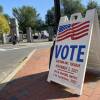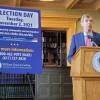As Bostonians prepare to cast their vote for the city's next mayor, GBH News reporters Adam Reilly and Saraya Wintersmith joined Boston Public Radio on Monday to share their analysis of the city's historic mayoral race in its final days.
Recent polling by MassINC Polling Group for WBUR, the Dorchester Reporter, and the Boston Foundation found that mayoral candidate Michelle Wu has a 32-percentage point lead over rival mayoral candidate Annissa Essaibi George among likely voters. However, ballots cast this election may not mirror recent polls — it all depends on who turns out.
“My sense from talking to folks who observe politics is that the spread will not be quite as wide as polls suggest,” Wintersmith said. “Whether or not that’s true, of course, we have to wait and see.”
“It’s worth noting that Essaibi George could run closer than people expect her to, and Wu could still win by a really commanding margin,” Reilly added. “Obviously, it’s still possible that Essaibi George will pull off a stunner.”
Reilly pointed to a recent GBH News piece by Yawu Miller, senior editor of the Bay State Banner, which examined how voter turnout patterns have changed in recent decades. The road to electoral victory may no longer run through communities populated by politically moderate, white, working-class voters in areas such as West Roxbury, South Boston, and certain neighborhoods in Dorchester.
More Local News
“It is pretty clear that in those areas, turnout has dropped off radically in the last few elections, and that you’ve seen an uptick in turnout in communities of color, and also in progressive enclaves like Jamaica Plain,” Reilly said. “So even if the overall turnout is not impressive, I think it’s worth noting that if Wu does win, and if she wins big, it’ll be a victory that’s driven in part by these shifts that are occurring.”
“That really changes your idea of how Boston politics actually work,” Reilly added.
Voters seem drawn to Wu’s “bigger ideas about the way the city can respond meaningfully to certain problems that we tend to think of as outside the city’s control,” as opposed to Essaibi George “pitching herself as someone who’s realistic about what city government can and can’t do.”
“Among other things, the margin suggests that voters by and large in Boston like Wu’s pitch more than Essaibi George’s,” Reilly said.
“It seems like a lot more people like the idea of big structural changes, pushed for on a city level,” Reilly added.
Complicating matters is an ad paid for by Bostonians for Real Progress on Friday, a Boston-based super PAC backing Essaibi George. The ad claims that Wu got a “sweetheart deal” on her Roslindale home, which numerous Boston media outlets have debunked.
“When an ad like this drops a couple days before the election, there’s not time for the candidate who’s been accused of wrongdoing to respond, and there’s not really time for the media to explain,” Reilly said. “We’ve looked into this, and in fact, there doesn’t seem to be anything there.”
Attorney Gerald A. McDonough sent a cease-and-desist letter to Comcast’s New England advertising wing on behalf of the Wu campaign, stating that “each individual claim in the ad itself is false and defamatory” and labeling the ad as “a scorched earth attack” on Wu.
“In talking to longtime political observers, it’s not normal to see this level of negativity in Boston mayoral campaigns. And in talking to one longtime hand in particular, they said that you normally want to end on a positive note in races like these,” Wintersmith said. “All of the differentiation and attacking should have come much earlier in the campaign — like days after the preliminary if that was the strategy. But to Adam’s point, how much can it land with voters in a couple of days?”
Reilly is co-host of GBH’s Politics podcast, “The Scrum.” Wintersmith covers Boston City Hall for GBH.








